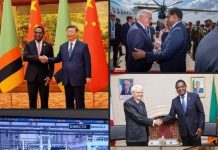Africa-Press – Zambia. In the age of instant communication and livestream politics, misinformation travels faster than truth. Former diplomat and political commentator Emmanuel Mwamba has became the latest example of how reckless online conduct can distort public discourse and sow unnecessary alarm.
Mr. Mwamba issued an apology after circulating a false image purporting to show former Justice Minister Hon. Given Lubinda hospitalized. In his explanation, he attributed the mistake to the “perils of live broadcasting,” saying the image was sent to him by a follower during a live session and that he uploaded it without verification.
While the apology is noted, the broader implications of his conduct cannot be ignored.
A Convenient Apology After the Damage
Mr. Mwamba’s explanation raises more questions than it answers. For a seasoned communicator who previously held diplomatic rank, the expectation of verification and responsible dissemination of information is not optional—it is fundamental.
His claim that the image was “sent by a member from Kabwe” does not absolve him of responsibility. Public figures with large followings understand that their posts carry weight and can ignite panic, anger, or public confusion.
The posting of a false medical image of a senior opposition figure, especially in a politically charged environment, cannot be brushed aside as a mere lapse. It reflects a troubling pattern in which misinformation is used to shape narratives, mobilize supporters, and provoke emotional reactions.
Shifting the Narrative Instead of Taking Responsibility
Even more concerning is Mr. Mwamba’s attempt to redirect the public’s focus immediately after admitting his falsehood.
“Let’s focus on the attack and abduction,” he wrote—an apparent effort to steer attention away from the misinformation he had just spread and toward yet another unverified, politically explosive narrative.
This tactic is familiar:
1. Release alarming, unverifiable information.
2. Allow the public to react emotionally.
3. When challenged, issue a short apology and pivot to a different, equally sensational claim.
This pattern does not inform the public, it manipulates them.
The Cost of Irresponsible Political Communication
Zambia’s democracy thrives on credible information, not digital theatrics. At a time when political tensions are heightened, the circulation of false images and dramatic claims of abduction or attack only fans the flames.
Such behaviour risks:
1. Undermining public trust in legitimate institutions;
2. Creating unnecessary fear among citizens;
3. Fueling political hostility;
4. Distracting from real national issues requiring sober, fact-based engagement.
Political actors and commentators must understand that freedom of expression comes with responsibility, especially when their platforms reach thousands.
What Zambians Deserve
Zambians deserve:
1. Verified news, not emotional manipulation;
2. Leaders who practice integrity, not opportunism;
3. Commentators who uplift truth, not sensationalism;
4. A political environment where facts matter more than clicks.
Misinformation is not a harmless mistake. It is a threat to democratic stability and public peace. The public must demand higher standards from those who present themselves as sources of information.
Mr. Mwamba’s apology is welcome, but insufficient. What is needed is a consistent commitment to verification, responsibility, and truth, values that should guide anyone engaged in shaping public opinion.
Until then, Zambians must remain vigilant, question sensational claims, and reject attempts to mislead them under the guise of political advocacy.
For More News And Analysis About Zambia Follow Africa-Press







